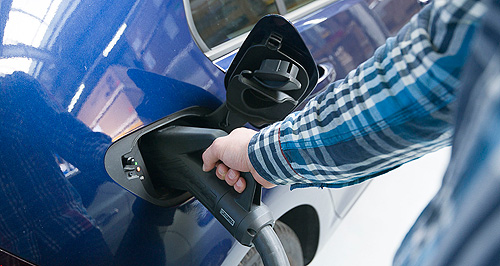Make / Model Search
News - General News - Electric VehiclesProactive government vital for EV uptake: TritiumCharging formation: Brisbane-based Tritium believes leadership is needed to drive the change in the automotive industry from internal combustion engines to battery-powered electric vehicles. EV tech firm says governments play key role in giving people confidence to buy an EV7 May 2019 By TUNG NGUYEN TRITIUM chief technology officer and co-founder James Kennedy believes the federal government needs to take a proactive approach to encourage mass-market adoption of electric vehicles or risk the country’s automotive fleet becoming obsolete.
Speaking to GoAuto, Mr Kennedy said the recent announcements by the Australian Labor Party and the Australian Greens on a national EV policy are a step in the right direction for consumer confidence.
“I think a large part of that is government interests,” he said. “Incentives notwithstanding, just encouraging electric vehicles can make a difference; we’ve certainly seen that in New Zealand, for instance.
“It gives people the confidence that this is going to happen and people are going to buy an EV for their next car.
“In general, having an EV policy at all would be a hugely positive step forward, obviously the details of what’s in that policy can make a huge difference.”
Current electrified car sales reflect the public’s apathy towards the alternatively powered vehicles, with combined hybrid (including plug-in) and full-electric sales last year reaching just 15,680 units, or around 1.4 per cent of the overall market.
Based in Brisbane, Tritium produces charging stations for service providers such as Chargefox and, in Europe, the joint-venture between BMW, Daimler, Volkswagen and Ford known as Ionity.
It currently offers two products – a standard 50kW unit and high-powered 350kW recharger – that are installed in 29 countries around the world.
Mr Kennedy said he believes the ramp up of charging stations in Australia will ease consumer concerns about the lack of infrastructure, mirroring developments in more mature EV markets such as Norway and the US.
“You’ve got a chicken-and-egg problem here in that people don’t want to put the infrastructure in until the cars are there, and we’re not going to get enough cars until the infrastructure is there,” he said.
“We’re certainly seeing time and time again that if you build it, they will come.
“You put the charging infrastructure in place, and people will see that and realise that this isn’t some weird thing for hippies to spend some money on, and that ‘I should consider an EV for my vehicle’.”
While only a handful of full-electric models are currently available on the Australian market, including the Tesla Model S, Hyundai Ioniq, BMW i3 and Jaguar I-Pace, a substantial rollout of new product over the next 12 months will see the Nissan Leaf, Audi e-tron and Mercedes-Benz EQC – among others – also launch locally.
Pricing will play a crucial role in determining sales, and Mr Kennedy highlighted the financial incentives put in place by the Norwegian government that put emissions-free models at a price parity with combustion-engined models.
The only model available in local showrooms with either a conventional combustion engine or full battery-electric powertrain is the Hyundai Kona, which requires a step up of about $30,000 – to around $60,000 plus on-road costs, depending on the variant – for the EV version.
The cheapest full-electric model currently on sale is Hyundai’s $44,990 Ioniq Electric, while the new-generation Nissan Leaf will command a $49,990 pricetag and the pint-sized Renault Zoe costs $47,490.
Asked if Labor’s plan of having EVs account for half of all new-vehicle sales in Australia by 2030 was realistic, Mr Kennedy said the target was far behind what other markets around have declared.
“That would definitely kickstart things,” he said. “Long-term it gets a bit interesting … there are multiple countries that have now banned internal combustion engines.
“We do a fair bit of work with the auto OEMs, particularly in Europe, and when the UK announced the internal combustion ban by 2040, those companies told us that they consider it almost a joke and that by 2040 they probably won’t be making internal combustion engines.
“I think that that will probably eventually finish off that adoption here in Australia because you can’t buy anything else.
“It’s still a fair way away, but I still think that something that people don’t realise is how rapid and inevitable EVs are.”
Although Mr Kennedy would not commit to a timeframe of when he expects EVs to be commonplace in Australia, he said the switchover could happen sooner rather than later.
“My crystal ball is a bit cloudy, but what we have seen from multiple studies and serious work over the past four or five years on predicted EV uptake rate has been incorrect,” he said.
“It is faster than almost anybody in even their most aggressive uptake scenarios – this is overseas, of course – I guess the question for Australia is what other country would be a good example of expected uptake rate.
“And that’s a question that is difficult to answer, and probably depends massively on things like infrastructure and all that.
“Obviously Norway is the upper end of the example of how fast things might go, but I don’t see that uptake for Australia at this point in time.
“The reality is, once you drive an EV, you’re probably not going to buy a petrol car as your next car.”  Read more1st of February 2019  Senate committee urges action on EV uptakeIncentives, stricter emissions, sales targets could be used to increase EV sales9th of October 2018  Porsche turns to third-party EV charging networkThird-party network to recharge Porsche Taycan battery-electric sportscar due in 202012th of March 2018  Tritium opens Netherlands officeQLD-based Tritium holds 20 per cent of European charger market after four years8th of March 2018  Local companies in manufacturing successExpertise in fast charging and carbon-fibre composites wins overseas agreements |
Click to shareGeneral News articlesResearch General News Motor industry news |











Facebook Twitter Instagram